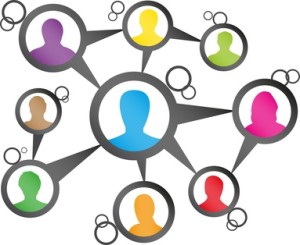 Searching for a single definition of Social CRM is difficult, and will often yield results that are too vague or too specialized to be of much use. The problem is with the application of Social CRM within the business community. Every business handles CRM and social engagement in different ways—meaning that Social CRM will change from one business environment to the next.
Searching for a single definition of Social CRM is difficult, and will often yield results that are too vague or too specialized to be of much use. The problem is with the application of Social CRM within the business community. Every business handles CRM and social engagement in different ways—meaning that Social CRM will change from one business environment to the next.
Instead of a single definition, it’s easier to look at Social CRM contextually. When examining how Social CRM is being used in the real world, separate, but interrelated, definitions can be more usefully applied.
As a Management Tool
Under its narrowest, and least popular, definition, Social CRM is indistinguishable from Social Media Monitoring (SMM). Under this definition, Social CRM is simply a technology based system for monitoring and responding to social media conversations about a company or brand. Here, it becomes a purely reactive tool for gathering information and attempting to manage brand reputation.
Prior to social media, when a customer left a store, he took his opinions with him. Any feelings that he shared with a few friends and family members were unknown to the business. In a few extreme instances, complaints or media attention may have made the business aware of any issues, but this was atypical. Today, a customer can instantly share his experiences with millions of people. Monitoring those conversations can provide valuable insights into what a business is doing right, and what it’s doing wrong.
Attempting to control those conversations can put a business on shaky ground. Some managers have engaged in vitriolic arguments with customers, in front of countless other potential customers, on social media platforms. Regardless of the actions of the complaining customer, this kind of activity will paint the business in a negative light. And, if there is a perception that the business is trying to obstruct an open discussion, the backlash could be swift, severe, and very public.
As a Sales Tool
A more popular interpretation is the idea that Social CRM is a tool for creating or increasing brand awareness, and pushing marketing campaigns. Data collected through SMM is used to create social advertising campaigns using a variety of outlets. These outlets can include paid advertisements on social media platforms, posts published on clients’ social media pages, messages sent to followers of the business’ social media pages, and other traditional outlets such as email.
Setting up social media pages as a marketing outlet offers some advantages to a business. Social media platforms are typically free, or extremely low-cost. This allows the business to reach a huge potential market with little up-front investment. Social media platforms are also interactive, allowing the business to respond to customers, collect information, and make sales using a single page.
There are limitations to the use of Social CRM as a marketing tool. For users, social media platforms are a place to share genuine interactions. It’s the place where they share family photos and inside jokes—overt sales tactics can diminish that dynamic, causing a backlash against the campaign.
Social CRM As a Customer Ecosystem
The broadest, and most popular, definition is offered by Paul Greenberg:
Social CRM is a philosophy and a business strategy, supported by a technology platform, business rules, workflow, processes and social characteristics, designed to engage the customer in a collaborative conversation in order to provide mutually beneficial value in a trusted and transparent business environment. It’s the company’s response to the customer’s ownership of the conversation.
Under this model, traditional CRM data is combined with data culled from social media platforms. The resultant data is then used to create a social experience in which the customer controls the flow and content of the conversation, and reaps tangible benefits from the experience.
This could include a social media page that provides customers with information regarding a business, as well as a way to get near-real-time feedback from the business itself. Customers find social media platforms less irritating than call centers or automated responses, and more convenient than waiting for normal business hours. These users exist in a 24-hour environment—and they appreciate being able to use the outlet of their choice to access businesses when it’s convenient for them.
Putting Them All Together
Whatever approach a business uses when combining CRM and social engagement, there are sure to be tangible benefits. The important thing to remember is how customers view and utilize that combination. By making sure that their Social CRM platform also provides tangible benefits for the consumer, businesses can avoid many of the pitfalls associated with social media. Approaching social media solely as a cost-cutting or marketing tool will have limited benefits and could actually end up alienating potential customers. Finding the right balance, and allowing customers to manage the flow of information, will reap greater rewards and create more satisfied customers.

